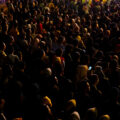Do you trust religion?
Do you trust religion?
‘Do you trust religion?’ is a difficult question with numerous answers. Over the years, many have turned away from it, whereas others notably have (re)gained trust in religion. This article takes a look at some of the many factors that are in play why people do or do not trust religion.
Over the years, the number of people attending church has declined radically.[1] [2] [3] For example, in Ireland, the amount of Catholic Mass visitors has dropped significantly during the past five decades.[4] Furthermore, in 2017, the majority of the Dutch population did not see itself as belonging to a religious group for the first time in history.[5] These developments are in line with a broader pattern of a decline in the influence of religion in the Western world. This process is also referred to as secularisation.[6] Do declining numbers of faithful reveal a loss of trust in religion? There has been no extensive research on the connection between the two, but nevertheless, the number of faithful might give us an indication of the level of trust. This is why we will also look into the causes of declining numbers of faithful.
An indication for the level of trust is the level of ‘subjective importance’ of religion, as claimed in a paper by the University of California, Berkeley, in which data from the Caucasus Research Resource Centers (CRRC) was used. According to the analysis of the data of the CRRC, the importance of religion in one’s daily life is seen as a key element in trust in religious institutions. It suggests that the more relevant religion is in someone’s life, the higher their level of trust in religious institutions.[7]
Is trust in religion declining?
Why is the number of faithful decreasing? Two reasons are inherent to our society: increased knowledge[8] and individualisation as a dominant aspect of our current society.[9] For example, research has found that the more diplomas, education, and (scientific) knowledge people have, the less they are inclined to go to church.[10] Furthermore, the Pew Research Center stated that in 2019, 51% of their research respondents thought believing in a God was not necessary in order to act morally correct.[11]
In addition to an increase in knowledge, a shift in focus on identity might play a role as well. People do not see religion as an important part of their identity anymore.[12] In Western society, the idea of individualism is presiding. People are looking for their own personal identity, in which the importance of religion is declining.[13] [14] Personal values and beliefs are more important, and if those do not line up with those of the church, people turn away.[15] Research by the SCP stated that Dutch people feel that churches do not comply with their personal views on life.[16] Furthermore, people are not satisfied with the church, as they find it too educating and bureaucratic.[17]
Apart from these causes of declining numbers that might mark a loss of trust, the same research by the SCP also found that at least two-thirds of the Dutch population have little to no trust in religious institutions.[18] This loss of trust can have other causes than those mentioned above. One can think of all the scandals surrounding abuse cases that have come to light.[19] [20] For example, the Catholic Church in Ireland has experienced a loss in trust because of abuse cases.[21] They do not help to trust the church as a religious institution, according to religion sociologist Kees de Groot of Tilburg University.[22]
In addition, the politicalisation of religion might be another reason for the diminished trust in religion. For instance, a study conducted by the University of Princeton found that many Muslims feel ‘pushed away’ by the political Islam.[23] This is also seen in the United States. President Trump supports evangelical church leaders, who mainly have conservative ideas, and vice versa.[24] The connection between the evangelical church and right-wing politics has led to the alienation of (young) socially-liberal Christians,[25] whose trust has decreased.
Finally, the secularisation of states has the potential to decrease a religion’s visibility in society in general. For example, since France installed its law of laïcité in 1905, any public display of religious signs is forbidden.[26] [27] Consequently, people learn, know, and see less of religion. This might also lead to decreased trust in religion.
Trusting religion more than ever?
As seen above, there are various reasons why trust in religious institutions might be declining. However, the developments described on the loss of trust and secularisation are examples from the Western world. The question arises whether that is the only side of the story. Could there be an increase in trust in religious institutions elsewhere? Although a specific rise of trust in religious institutions is hard to point out with exact numbers, there are several clues that might suggest an increase of trust in religious institutions in the non-Western world. For example, the number of faithful within the Catholic Church in Africa, South America, and Asia is rising generously.[28] Furthermore, the Pentecostal-Charismatic Church is growing, and Islam as well.[29] Of course, a rise in followers does not automatically mean a rise in trust, but they might be closely related.
Taking the importance of religion itself into account, there are multiple indicators that religion in general is of increased importance. In 2019, Pew Research Center found that approximately two-thirds of the world population think believing in God is important, and think praying is an important part of religion.[30] In addition, the same research center found that during a time of crisis, more people turn to prayer – even those without a religion.[31] Researcher Jeanet Sinding Bentzen explained that these people seek a way to reduce stress and find an explanation for the crisis upon them. Research from Harvard University pointed out that people who have experienced war – which is an extreme crisis – are more likely to be or become religious.[32] Currently, the world is experiencing a huge state of crisis due to the coronavirus pandemic, causing people to be restricted to their homes. As gatherings in churches became increasingly restricted, thousands of people tuned in to online church services.[33] In addition, religious leaders have seen more people searching for answers to make sense of this crisis, which has resulted in a stimulation of religious views.[34] Furthermore, in the Netherlands, people between 17-30 years old are more connected to religion than older people,[35] although this connection does not necessarily take place within religious institutions. Answers to life questions (e.g. on how to behave or live a good life) are also sought outside the church and online, but still within the Christian tradition.[36]
Can these examples – belief in God seen as important, turning to prayer during crises, and seeking for answers within a religious tradition – be seen as indicators that religion itself is trusted in a certain way? Or even as indicators that religious institutions are not so distrusted as it might seem? The events described above raise questions on whether we can truly speak of a decline of trust, be it in religious institutions or even in religion itself.
Trust in the future
Taking these developments in trust in religion over the years into account, the question of the future of trust in religion naturally arises. Trust in religion will depend on the evolution of religion. How can it evolve in order to (re)gain trust? Does religion need to evolve towards something that is more compatible with a secular state? Do religious leaders have to act differently? These are interesting questions to think about and discuss.
Astrid Hamberg
Learn more about religion and society on the EARS Dashboard.
[1] In U.S., Decline of Christianity Continues at Rapid Pace
[2] More than 220,000 people left the Protestant Church of Germany in 2018
[3] The Guardian view on atheism: good without God | Editorial
[4] Being religious is now a countercultural identity
[5] Meer dan de helft Nederlanders niet religieus
[6] McKenzie, Germán, Interpreting Charles Taylor’s Social Theory on Religion and Secularization. A Comparative Study. Sophia Studies in Cross-cultural Philosophy of Traditions and Cultures 20, Springer 2017.
[7] Religiosity and Trust in Religious Institutions:
[8] Meer diploma’s leiden tot lege kerken
[9] individualism | Definition, History, Philosophy, Examples, & Facts
[10] Meer diploma’s leiden tot lege kerken
[11] Onderzoek: Religie wereldwijd voor meeste mensen belangrijk – Kerk & religie
[12] Being religious is now a countercultural identity
[13] How the early Christian church gave birth to today’s WEIRD Europeans
[14] individualism | Definition, History, Philosophy, Examples, & Facts
[15] Geloof het of niet
[16] SCP constateert dat ontkerkelijking in hoog tempo doorzet
[17] Christen an Ostern: Immer weniger Deutsche glauben an Gott – DER SPIEGEL
[18] SCP constateert dat ontkerkelijking in hoog tempo doorzet[19] Perspective | I was the first woman to publicly accuse gymnastics doctor Larry Nassar. But I was also abused in my own church.
[20] EKD arbeitet Missbrauch auf: “Die Last bleibt ein Leben lang”
[21] Kirche in Irland: Im freien Fall
[22] Waarom gaan steeds minder mensen naar de kerk?
[23] Neue Studie – Verliert die arabische Welt den Glauben an die Religion?
[24] Trumps zelfverheerlijking is inmiddels van messianistische proporties
[25] Trump’s row with Christianity Today exposes deep issues with white evangelical America
[26] Loi du 9 décembre 1905 concernant la séparation des Eglises et de l’Etat.
[27] Please read more about laïcité here.
[28] Pope Francis in Africa: Is the continent the Catholic Church’s great hope?
[29] Suomi maallistuu, mutta maailma muuttuu yhä uskonnollisemmaksi – Islam kuroo kiinni kristinuskon etumatkaa
[30] Onderzoek: Religie wereldwijd voor meeste mensen belangrijk – Kerk & religie
[31] People are praying more as a result of the coronavirus pandemic – research
[32] Study Asks If War Makes A Person More … Or Less … Religious
[33] Keeping the faith: religion in the UK amid coronavirus
[34] Keeping the faith: religion in the UK amid coronavirus
[35] SCP constateert dat ontkerkelijking in hoog tempo doorzet[36] Is er een nieuw soort christendom aan het ontstaan?






